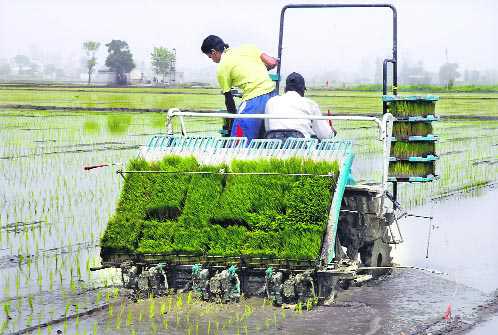
Vibha Sharma
Tribune News Service
New Delhi, February 27
The Economic Survey has made significant observations for the agriculture sector — the primary mainstay of half of the country’s workforce. It advises “bold actions” and changes in the system such as enacting a legislation to set up a national common market for specified agricultural commodities.
Though the need for setting up a national market was emphasised in the last Budget and Centre also moved forward to encourage states to develop farmer markets in towns to enable farmers to sell produce directly, the Survey said: “More steps may have to be taken and incremental moves may need to be considered to get states on board.”
Significantly, the Survey calls for “rationalisation of subsidies and better targeting of beneficiaries through direct transfers” — perhaps an indication of the NDA’s outlook towards the sector as it tries to shift focus to areas which have not benefitted much from MSP regimes and Centre-aided procurement.
Pricing instruments — minimum support price and Central issue price to provide affordable and stable prices — effectively operate primarily in wheat and rice and that too in selected states, creating incentive structures highly skewed in favour of the two grains, it says.
The Survey also talks of distortions in the market emerging from various policies, including exempting user charges of electricity and water. This, the government’s economic report card says, needs to be reduced through better targeting and eliminating leakages.
As per the report, the decade-long shift in terms of trade towards agriculture may have come to an end as global prices have peaked. As terms of trade deteriorate and rural incomes come under pressure, the political pressure for support will increase. Already there are proposals to increase tariffs in sectors such as oilseeds and pulses and provide export subsidies to sugar, it adds.
While short-term response is to enhance targeted support for vulnerable section — small and marginal farmers — like MNREGA but long-term measures would be to ensure that agriculture grows at about four per cent on a sustained basis and creation of a national common market for agricultural produce, it says.
Control over agricultural markets is a domain of the state governments but the Survey recommends “bold actions” to move further from mere “persuasion” to using Constitutional provisions for enacting legislation to set up a national common market for specified agricultural commodities.
It means the Union Government makes use of entries in the Union List and the Concurrent List of the Seventh Schedule to change law rather than waiting for the states to do it.
Criticising the operations of Agricultural Produce Market Committee Act (APMC) enacted by the state governments, the Survey says: “They enjoy a cosy relationship with the licensed commission agents who wield power by exercising monopoly power within the notified area, at times by forming cartels. The resistance to reforming APMCs is perceived to be emanating from these factors”.
Markets in the agricultural products are regulated under the APMC Act enacted by the state governments. There are about 2,477 principal regulated markets based on geography, called agriculture produce market committee and 4,843 sub-market yards regulated by the respective APMCs in India.
“Effectively, India has not one but thousands of agriculture markets,” the Survey says, highlighting that multiplicity of fees and tax have a cascading impact on the prices of the commodity when it passes through the supply chain. For instance, these charges can be as high as 14.5% in Andhra Pradesh, excluding state value added tax and close to 10% in Odisha and Punjab.
The model APMC has attempted at creating greater competition by giving farmers some freedom to sell their produce directly to the contract-sponsors or in the market set up by private individuals, consumers or producers.
However, as per the Survey, the model Act treats the APMC as an arm of the state and the market fee as the tax levied by the state, rather than fee charged for providing services. “This acts as a major impediment to creating national common market in agriculture commodities. Removal of this provision will create competition and a national common market for agriculture commodities.”



























